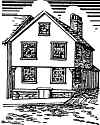|
A Radio Talk by Charles F. Kettering  Benjamin Franklin was born in a house on Milk Street in Boston. Today
we would say young Franklin was dynamic, for at the age of 17 his
energy took him from Boston via New York to Philadelphia.
Benjamin Franklin was born in a house on Milk Street in Boston. Today
we would say young Franklin was dynamic, for at the age of 17 his
energy took him from Boston via New York to Philadelphia. Later he was sent to London to learn more about the printing business and to study "natural philosophy" as "science" was called in those days. When he came back to Philadelphia, he set up a printing shop of his own and published, among other things, "Poor Richard's Almanack" which still ranks as one of the all-time best sellers. In addition to printing, he invented a stove, an improved outdoor lamp, and promoted paved streets in an attempt to raise the sanitary standards of the American city. The Junto Club which he organized to spread culture became probably America's first circulating library. |








